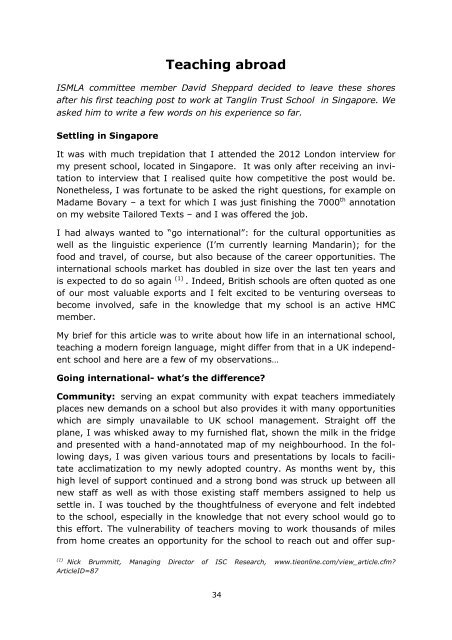Summer 2013 - The Independent Schools' Modern Language ...
Summer 2013 - The Independent Schools' Modern Language ...
Summer 2013 - The Independent Schools' Modern Language ...
You also want an ePaper? Increase the reach of your titles
YUMPU automatically turns print PDFs into web optimized ePapers that Google loves.
Settling in Singapore<br />
Teaching abroad<br />
ISMLA committee member David Sheppard decided to leave these shores<br />
after his first teaching post to work at Tanglin Trust School in Singapore. We<br />
asked him to write a few words on his experience so far.<br />
It was with much trepidation that I attended the 2012 London interview for<br />
my present school, located in Singapore. It was only after receiving an invitation<br />
to interview that I realised quite how competitive the post would be.<br />
Nonetheless, I was fortunate to be asked the right questions, for example on<br />
Madame Bovary – a text for which I was just finishing the 7000 th annotation<br />
on my website Tailored Texts – and I was offered the job.<br />
I had always wanted to “go international”: for the cultural opportunities as<br />
well as the linguistic experience (I’m currently learning Mandarin); for the<br />
food and travel, of course, but also because of the career opportunities. <strong>The</strong><br />
international schools market has doubled in size over the last ten years and<br />
is expected to do so again (1) . Indeed, British schools are often quoted as one<br />
of our most valuable exports and I felt excited to be venturing overseas to<br />
become involved, safe in the knowledge that my school is an active HMC<br />
member.<br />
My brief for this article was to write about how life in an international school,<br />
teaching a modern foreign language, might differ from that in a UK independent<br />
school and here are a few of my observations…<br />
Going international- what’s the difference?<br />
Community: serving an expat community with expat teachers immediately<br />
places new demands on a school but also provides it with many opportunities<br />
which are simply unavailable to UK school management. Straight off the<br />
plane, I was whisked away to my furnished flat, shown the milk in the fridge<br />
and presented with a hand-annotated map of my neighbourhood. In the following<br />
days, I was given various tours and presentations by locals to facilitate<br />
acclimatization to my newly adopted country. As months went by, this<br />
high level of support continued and a strong bond was struck up between all<br />
new staff as well as with those existing staff members assigned to help us<br />
settle in. I was touched by the thoughtfulness of everyone and felt indebted<br />
to the school, especially in the knowledge that not every school would go to<br />
this effort. <strong>The</strong> vulnerability of teachers moving to work thousands of miles<br />
from home creates an opportunity for the school to reach out and offer sup-<br />
(1)<br />
Nick Brummitt, Managing Director of ISC Research, www.tieonline.com/view_article.cfm?<br />
ArticleID=87<br />
34



